高中英语考点词语的重要解析
高中英语必修4Unit5重点短语解析

高中英语必修4Unit5重点短语解析高中英语必修4 unit5重点词语及短语解析unit 5 theme parkswarming up,pre-reading,reading重点短语解析e to life 活跃起来,苏醒过来;变得有趣或使人更兴奋注意:come to life为不及物动词短语,不用于被动语态,也不用于进行时态。
归纳拓展come back to life/one`s senses 苏醒过来come to yourself 恢复常态come to sb.(主意,办法等)被想出come to sth.合计,共计,达到bring...to life 使……更有趣,恢复生机The wounded soldier came to life soon after he was taken to hospital.那位受伤的战士被送到医院后不久就苏醒了。
The match finally came to life in the second half.比赛在下半场终于精彩起来。
Flowers can bring a dull room back to life.鲜花可使沉闷的房间恢复生气。
The idea came to me in the bath.我洗澡时,想出了这个主意。
2.chargein charge, in charge of, in the charge ofin charge 和in charge of 的意思均为“主管”“负责”,都可用作表语或定语,后者还可作状语。
in the charge of 表示“由……主管”,主语一般是表示事物或单位的名词,of 的宾语用表示人的名词或代词。
如:1. If you take part in the sports meeting,please tell Mark. He is in charge.如果你参加运动会,请告诉马克。
他负责。
2. Mother puts the baby in the charge of the baby sitter while she is out.母亲外出时将小孩交保姆照料。
高中英语重点语法知识点归纳解析
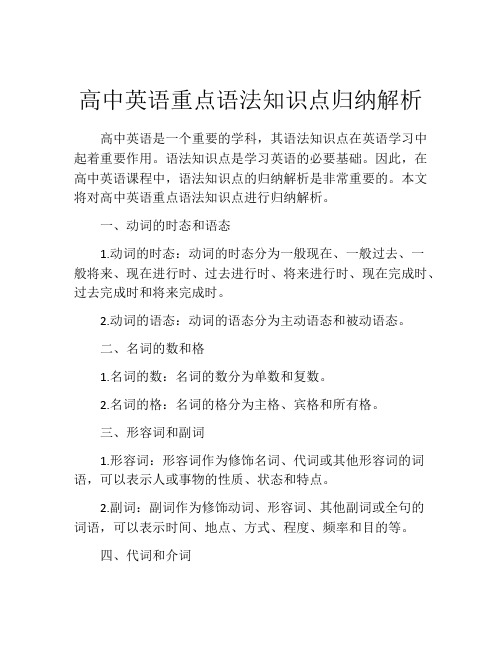
高中英语重点语法知识点归纳解析高中英语是一个重要的学科,其语法知识点在英语学习中起着重要作用。
语法知识点是学习英语的必要基础。
因此,在高中英语课程中,语法知识点的归纳解析是非常重要的。
本文将对高中英语重点语法知识点进行归纳解析。
一、动词的时态和语态1.动词的时态:动词的时态分为一般现在、一般过去、一般将来、现在进行时、过去进行时、将来进行时、现在完成时、过去完成时和将来完成时。
2.动词的语态:动词的语态分为主动语态和被动语态。
二、名词的数和格1.名词的数:名词的数分为单数和复数。
2.名词的格:名词的格分为主格、宾格和所有格。
三、形容词和副词1.形容词:形容词作为修饰名词、代词或其他形容词的词语,可以表示人或事物的性质、状态和特点。
2.副词:副词作为修饰动词、形容词、其他副词或全句的词语,可以表示时间、地点、方式、程度、频率和目的等。
四、代词和介词1.代词:代词可以替代名词,省略重复的名词,并在一定的语法结构中起到一些特殊的作用。
2.介词:介词用于表示名词、代词和动词等成分与句子其他成分或它们之间关系的词语。
五、连词和从句1.连词:连词用于连接两个句子或短语,包括并列连词、转折连词、因果连词和附加连词等。
2.从句:从句是一个相对独立的句子,必须通过主句来表达其完整的语法含义。
六、定语从句和状语从句1.定语从句:定语从句是用来修饰名词或代词的从句。
2.状语从句:状语从句是用来修饰动词、形容词或副词的从句。
七、虚拟语气和倒装句1.虚拟语气:虚拟语气是指用来表示不真实、与事实相反或未实现的语气。
2.倒装句:倒装句是按照与基本语序不同的顺序排列主谓语序列进行表达的句子。
综上所述,高中英语重点语法知识点的归纳解析具有重要意义,学生应充分掌握并实践应用,以达到英语学习的最佳效果。
高中英语语法之重难点词语精析

高中英语语法之重难点词语精析
高中英语语法之重难点词语精析
高中英语语法之重难点词语精析
一、常用词语
1. exercise 意为习题;(书面)练习时为可数名词。
例如:
Study the lesson, and then do the exercises at the end.
学课文,然后做后面的练习。
exercise 还可表示(体育或器官)运动;活动;锻炼,笼统指运动时为不可数名词;指具体某项运动时为可数名词。
例如:If you don't take / get more exercise, you'll get fat.
你不多锻炼就会发胖。
gymnastic exercises 体操运动
breathing exercises 呼吸运动
2. cover 意为盖,遮盖;采访,报道。
例如:
The ruins were soon covered by thick forests.
废墟很快被茂密的树林所覆盖。
Reporters are then sent to cover the events.
然后记者被派去采访这个事件。
试 cover 在不同语境中的词义变化:
He covers 5 kilometers an hour.
他每小时行走 5 公里。
How many pages have you covered?
你已读完 / 讲完 / 学完多少页了?。
高中英语重点词汇讲解

U1 重点词汇讲解一、重点词汇列表二、精选词汇讲解1. experience(1)可数名词“经历”something that happens to you or something you do, especiallywhen this has an effect on what you feel or think:This was my first experience of living abroad.Failing an exam was a new experience for me.Getting caught in the flood was quite an experience for me.(2)不可数名词“经验”knowledge or skill that you gain from doing a job or activity, or theprocess of doing this:Experience is the best teacher.I have some first-hand experience in skiing.Nowadays people prefer to hire someone with work experience.(3)动词to feel, to suffer, to know an experience:Have you ever experienced real hunger?It’s the most wonderful feeling that I have ever experienced.(4)experience →experienced形容词,“有经验的”an experienced teacheran experienced reporter* be experienced at/in +名词/doing somethingShe is quite experienced in medicine.Jenny is experienced at teaching beginners.Tom is experienced in dealing with difficult customers.2. attend动词(1)“出席,到场”to go to …, to be present at …* 及物动词vt.Did you attend the meeting yesterday?He didn’t attend his brother’s wedding.* 不及物动词vi.Please let me know if you are unable to attend.Everyone is expected to attend.(2) “上学,上课”to go regularly to a schoolHe is the first one in his family to attend college.Though he was born in China, he attended high school in the US.3. earn 动词(1)“挣钱”to receive money by workingShe doesn’t earn much money, but she enjoys the work.Most people in this company earns around 50 thousand dollars a year.earn a living = make a livingearn one’s living = make one’s livingHe earns his living as a teacher.(2)“赢得”to get something as a result of one’s effortsHe earned a lot of praise because of his honesty.She earned a reputation as the best teacher of the school.His achievement earned him respect and admiration.4. average(1) 形容词*“平均的”:the average rainfall平均降雨量the average temperature平均气温Tom is of average height.The average age of the students in this school here is 16.*“一般的,普通的”neither very good nor very badShe looks like an average teacher.An average American eats more than 10 pounds of chocolate a year.(2) 名词*“平均,平均数”The average of five and three is four.Do you know how to work out an average? 你知道怎样算平均数吗?This year’s rainfall comes close to the average.(3) average的词组:* on (the) averageOn average, I receive 15 e-mails every day.On the average, men still earn more than women.* above (the) average / below (the) averageHer grades are above the average.The cost of living in this city is below the average.5. donate动词“捐献,捐款”to give something, especially money, to a person or an organization in order to help them:* donate something to somebody/somethingLast year he donated $1,000 to cancer research.She donated one million yuan to the Hope Project.Now more and more people volunteer to donate blood to the blood bank.* donate →donation 名词“捐献”donation to…There have been donations from around the world to the flooded areas.Would you like to make a donation to the school?6. regret(1) 动词过去式、过去分词:regretted, 现在分词:regretting* 懊悔、悔恨、惋惜to feel sorry about something you have done and wish you had not done it:I've never regretted the decision.Don't do anything you might regret.* regret doing somethingI now regret leaving school so young.He deeply regrets losing his temper last night.* regret + that- 分句He was beginning to regret that he'd come along.She regrets that she never went to college.* 对……感到抱歉、遗憾used in official letters or statements when saying that you aresorry or sad about something:We regret any inconvenience caused to our customers.* regret + that- 分句I regret that I will be unable to attend your lecture.* regret to do (regret to say / inform / tell …)I regret to inform you that you owe the bank $10,000.We regret to tell you that you failed in your driving test.(2) 名词懊悔、悔恨、惋惜sadness that you feel about something, especially because you wish it had not happened:He said he had no regrets about leaving the city.She has already expressed deep regret for what happened.* with regretThey said goodbye with deep regret.I decided with some regret that it was time to move on.* to somebody's regretI lost touch with her, much to my regret.To our regret, he was not accepted by Harvard.7. run动词“控制、管理”to organize or be in charge of an activity, business, organization, or country:For a while, she ran a restaurant in Boston.Some married women manage to work out and run a home as well.well-run ←→badly-runThe hotel is well-run and very popular.The hotel is badly-run and not popular at all.8. approve(1) 及物动词“批准,通过”to officially accept a plan, proposal, etc.:The President approved the building plan.(2) 不及物动词“赞成,认可,同意”to think that something /somebody is good, right, orsuitable* approve ofHer parents don’t approve of their marriage.I don’t approve of your choice.(3) approve →approval 名词approve →disapprove反义词9. inform动词,“通知”to officially tell someone about something or give them information:* inform somebody about/of somethingPlease inform us of any change of address as soon as possible.They decided to inform the police of the missing boy.* inform somebody + that-从句We regret to inform you that your application has been rejected.Unfortunately we were informed that the lecture had been cancelled, so we didn’t go. 三、词汇拓展训练(一)单项填空:1. ---- Are you free tomorrow afternoon?---- I’m afraid not. I’ll have to __________ an important lecture given by a famous professor.A. joinB. take part inC. attendD. enter2. The Chief Manager made a donation of one million _________ the City Museum.A. toB. atC. onD. for3. They failed to finish the project in time. I regretted _________ them.A. to be not able to helpB. being not able to helpC. not being able to helpD. not be able to help4. Still, some women do not have any full-time jobs because their husbands do not ________.A. agreeB. approveC. allowD. admit5. History is my favorite subject. So I think I’ll __________ physics and chemistry when I reach Senior II.A. stopB. dropC. desertD. leave6. Through hard work you will ________ the respect of your fellow workers.Which of the following is not appropriate?A. gainB. earnC. winD. accept7. We’ll be having a picnic this afternoon by the lake. Why don’t you come and ________ us?A. take part inB. attendC. joinD. enter8. It is ________ deep regret that we have to report the death of the pupils.A. toB. ofC. withD. in9. We will inform you __________ writing ________ the changes as soon as possible.A. for … inB. at … onC. in … ofD. on … about10. He is a great success as a scientist, but he hasn’t ________in teaching.A. many experiencesB. much experienceC. an experienceD. a lot of experiences(二)单词拼写:1. The job wasn’t ___________ enough for me. I want something more creative. (富有挑战性的)2. She is studying American ____________ at Georgetown University at present. (文学)3. The students are working hard every day, in ___________ for the big examination. (准备)4. Older people often complain that the younger ____________ don’t know what hard work is. (一代人)5. It takes an _________ of two weeks to finish a task like this. (平均)6. The village schools are in great need of ______________ teachers. (有经验的)7. Have a rest before you __________ with your reading. (继续)8. The Internet is ___________ at a very fast speed. (发展)9. People in this neighborhood can use the gym at no _________ cost. (额外的)10. The Ming ___________ ruled China from 1368 to 1644. (朝代)(三)词组填空:1. According to this research, ________ women live between five to seven years longer than men.2. Before I open the letter, let’s _________ ourselves _______ the news, whether it is good or bad.3. I think doctors should ________ the patients _______ the side effects of the medicine they take.4. Peter, I want to _________ you _________ my family.5. He has offered to do the job ___________.6. Do you think you are willing to ___________ some of your time ________ the volunteer work?1. I lost touch with her, much ____________.2. Her performance last night was well ____________, which surprised everyone.3. I do not ____________ your choice of friends.4. If you don’t _____________ the teacher in class, I don’t think you will pass the examination.5. You will soon regret it if you ___________.6. If you want to be a good boss, you will have to ____________ from your employees first.(四)综合填空:1. ---- How was your trip to Beijing?---- Great. My only r___________ was that I had no time to visit the Great Wall.2. ---- What are we having for d___________?---- Ice-cream, cheese cake and chocolate pudding.3. ---- How much are these books?---- Five dollars each. But if you buy two, you could get the third one for f_______.4. ---- May I i___________ myself? I’m Jerry Blom, assistant to Dr. Smith.---- Nice to meet you.5. ---- Why don’t you buy that cellphone? It’s 30% off today!---- Not unless my parents a____________.6. ---- What’s the matter, officer? I was driving at 50 miles an hour. I wasn’t speeding.---- Sir, you are r___________ by law to wear a seat belt.7. ---- What’s your new boss like?---- Oh, she is hard to p________. Everything should be perfect.8. ---- Look at the mistakes! You are not paying a___________ in class!---- I’m sorry sir. I promise I’ll listen more carefully.9. ---- Wha t’s your secret to success?---- The reason I a__________ good results is that I work hard. So could you!10. ---- Do you agree with me?---- I totally disagree with you, but I r__________ your opinion.(五)短文填空:I studied at a British high school for one school year. It was quite an ___1___ for me. My class with 29 students is of ___2___ size in Britain, but much smaller according to the Chinese standard. At first, I find the homework a little ___3___ as everything was in English, but I soon got used to it. Later I made great progress in English. I worked hard and ___4___ high grades so I earned ___5____ from my classmates. After school I enjoyed ___6___ under a tree or sitting on the grass. When I ___7___ my family and friends, I would ___8___ them at lunchtime in the school Computer Club for ___9___. One thing I like about British food is the ___10___ after the main meal.KEYS(一)单项填空:1-5: CACBB 6-10: DCCCB(二)单词拼写:1. challenging2. Literature3. preparation4. generation5. average6. experienced7. continue8. developing9. extra 10. Dynasty (三)词组填空:A1. on average2. prepare … for3. inform … of4. introduce … to5. for free6. donate … toB1. to my regret2. above average3. approve of4. pay attention to5. miss the chance6. earn respect(四)综合填空:1. regret2. dessert3. free4. introduce5. approve6. required7. please8. attention9. achieve 10. respect (五)短文填空:1. experience2. average3. challenging4. achieved5. respect6. relaxing7. missed8. e-mail9. free 10. dessert。
高中英语语法知识汇总之词语辨析整理
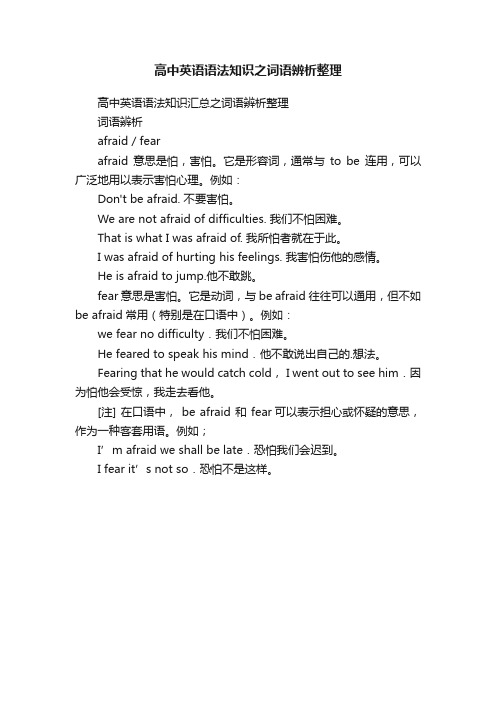
高中英语语法知识之词语辨析整理
高中英语语法知识汇总之词语辨析整理
词语辨析
afraid / fear
afraid 意思是怕,害怕。
它是形容词,通常与to be连用,可以广泛地用以表示害怕心理。
例如:
Don't be afraid. 不要害怕。
We are not afraid of difficulties. 我们不怕困难。
That is what I was afraid of. 我所怕者就在于此。
I was afraid of hurting his feelings. 我害怕伤他的感情。
He is afraid to jump.他不敢跳。
fear 意思是害怕。
它是动词,与be afraid往往可以通用,但不如be afraid常用(特别是在口语中)。
例如:
we fear no difficulty.我们不怕困难。
He feared to speak his mind.他不敢说出自己的.想法。
Fearing that he would catch cold, I went out to see him.因为怕他会受惊,我走去看他。
[注] 在口语中, be afraid 和 fear可以表示担心或怀疑的意思,作为一种客套用语。
例如;
I’m afraid we shall be late.恐怕我们会迟到。
I fear it’s not so.恐怕不是这样。
高中英语考点词语的重要解析
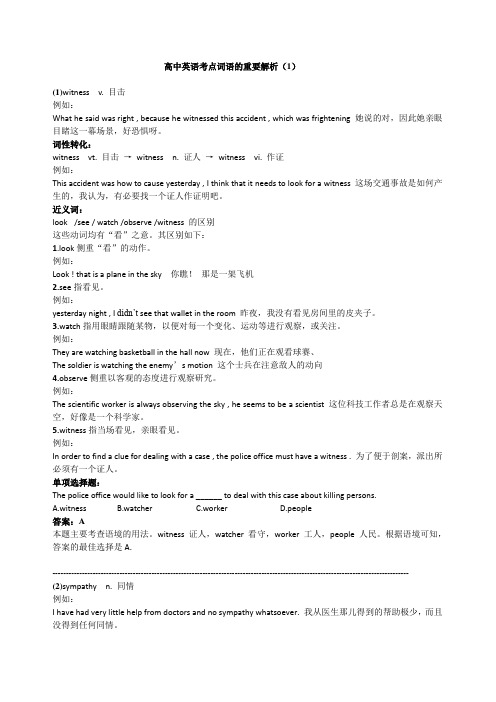
高中英语考点词语的重要解析(1)(1)witness v. 目击例如:What he said was right , because he witnessed this accident , which was frightening 她说的对,因此她亲眼目睹这一幕场景,好恐惧呀。
词性转化:witness vt. 目击→witness n. 证人→witness vi. 作证例如:This accident was how to cause yesterday , I think that it needs to look for a witness 这场交通事故是如何产生的,我认为,有必要找一个证人作证明吧。
近义词:look /see / watch /observe /witness 的区别这些动词均有“看”之意。
其区别如下:1.look侧重“看”的动作。
例如:Look ! that is a plane in the sky 你瞧!那是一架飞机2.see指看见。
例如:yesterday night , I didn’t see that wallet in the room 昨夜,我没有看见房间里的皮夹子。
3.watch指用眼睛跟随某物,以便对每一个变化、运动等进行观察,或关注。
例如:They are watching basketball in the hall now 现在,他们正在观看球赛、The soldier is watching the enemy’s motion 这个士兵在注意敌人的动向4.observe侧重以客观的态度进行观察研究。
例如:The scientific worker is always observing the sky , he seems to be a scientist 这位科技工作者总是在观察天空,好像是一个科学家。
5.witness指当场看见,亲眼看见。
高中3500词 词语解析
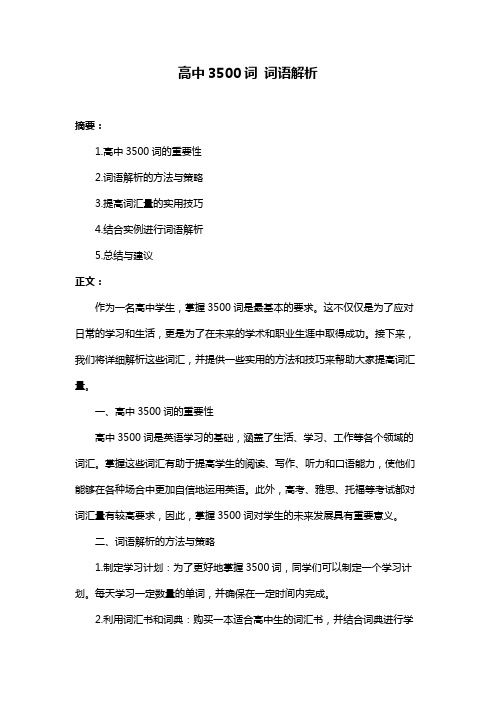
高中3500词词语解析摘要:1.高中3500词的重要性2.词语解析的方法与策略3.提高词汇量的实用技巧4.结合实例进行词语解析5.总结与建议正文:作为一名高中学生,掌握3500词是最基本的要求。
这不仅仅是为了应对日常的学习和生活,更是为了在未来的学术和职业生涯中取得成功。
接下来,我们将详细解析这些词汇,并提供一些实用的方法和技巧来帮助大家提高词汇量。
一、高中3500词的重要性高中3500词是英语学习的基础,涵盖了生活、学习、工作等各个领域的词汇。
掌握这些词汇有助于提高学生的阅读、写作、听力和口语能力,使他们能够在各种场合中更加自信地运用英语。
此外,高考、雅思、托福等考试都对词汇量有较高要求,因此,掌握3500词对学生的未来发展具有重要意义。
二、词语解析的方法与策略1.制定学习计划:为了更好地掌握3500词,同学们可以制定一个学习计划。
每天学习一定数量的单词,并确保在一定时间内完成。
2.利用词汇书和词典:购买一本适合高中生的词汇书,并结合词典进行学习。
在遇到生词时,查阅词典了解单词的词义、用法和例句。
3.制作单词卡片:将单词和其释义写在卡片上,便于随时查阅和复习。
4.多读多写:通过阅读英语文章、书籍和报纸,以及在写作中运用所学词汇,提高词汇的运用能力。
5.参加英语角和语伴交流:利用课余时间参加英语角活动,与同学、老师进行英语交流,提高口语词汇量。
三、提高词汇量的实用技巧1.联想记忆法:通过将单词与生活中的实物、场景或其他单词联系起来,增强记忆效果。
2.词根词缀法:了解词根和词缀的变化,有助于更好地理解和记忆单词。
3.记忆单词家族:学习单词的近义词、反义词及其用法,扩大词汇范围。
4.定期复习:按照艾宾浩斯遗忘曲线进行复习,巩固已学词汇。
四、结合实例进行词语解析以下是一些高中3500词的实例:1.sustainable(可持续的):Nowadays, more and more countries are focusing on sustainable development to protect our planet.2.epidemic(流行病):The government has taken various measures to prevent the spread of the epidemic.3.innovative(创新的):In order to promote technological innovation, many companies have set up research and development centers.五、总结与建议掌握高中3500词是英语学习的关键。
高一词汇考点解析重点记忆的单词和短语
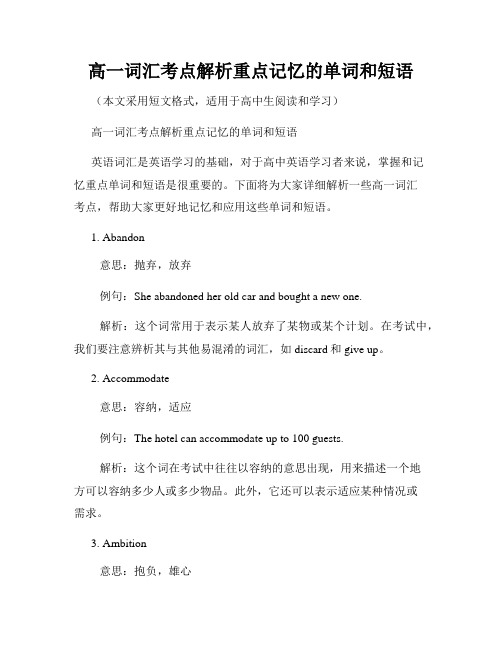
高一词汇考点解析重点记忆的单词和短语(本文采用短文格式,适用于高中生阅读和学习)高一词汇考点解析重点记忆的单词和短语英语词汇是英语学习的基础,对于高中英语学习者来说,掌握和记忆重点单词和短语是很重要的。
下面将为大家详细解析一些高一词汇考点,帮助大家更好地记忆和应用这些单词和短语。
1. Abandon意思:抛弃,放弃例句:She abandoned her old car and bought a new one.解析:这个词常用于表示某人放弃了某物或某个计划。
在考试中,我们要注意辨析其与其他易混淆的词汇,如discard和give up。
2. Accommodate意思:容纳,适应例句:The hotel can accommodate up to 100 guests.解析:这个词在考试中往往以容纳的意思出现,用来描述一个地方可以容纳多少人或多少物品。
此外,它还可以表示适应某种情况或需求。
3. Ambition意思:抱负,雄心例句:His ambition is to become a famous writer.解析:这个词常用于表示某人的目标、抱负和追求有关。
在写作时,我们可以用ambition来描述自己的梦想和为之努力的事情。
4. Analyze意思:分析例句:The scientists analyzed the data carefully.解析:这个词在考试中常常以分析的意思出现,用来描述对事物进行仔细而系统的分析。
另外,我们还可以用其派生词analytical来形容具有分析能力的人。
5. Compose意思:组成,创作例句:Beethoven composed many famous symphonies.解析:这个词常用于表示组成某个整体,也可以表示创作音乐、写作文等。
在考试中,我们还需注意与其他易混淆的词汇区分,如compose和comprise。
6. Demonstrate意思:展示,证明例句:The professor demonstrated the experiment to the students.解析:这个词常用于表示展示、演示或证明某种观点、事实等。
高中英语词汇考点及答案解析

高中英语词汇考点及答案解析英语词汇量对于学习者来说是非常重要的一项技能,它直接关系到英语学习质量的高低。
对于高中生而言,英语词汇考试是一个重要的考点,需要学生合理规划学习时间并且系统性的拓展自己的词汇量。
本文将针对高中英语词汇考点进行分析,并给出一些答案解析,帮助学生们提高英语词汇水平。
一、常用高中英语单词1. analysis 分析2. controversial 有争议的3. diversity 多样性4. era 时代5. fundamental 基础的6. global 全球的7. hypothesis 假设8. innovate 创新9. justify 证合10. knowledge 知识二、高中英语考点——词汇分类题高中英语考试中的词汇分类题,是一种将词汇分类,然后根据分类清晰直观地呈现出来的题目。
这些分类可包括形容词,动词,名词等。
这种题目需要学生掌握一定的词汇积累技巧,才能解答这种题目。
举个例子,如下:Instructions: Choose suitable words from the box to fill in the blanks, and each word can be only used once.decline enlarge expose relocate utilize1. Some fish are threatened with ________ in numbers because of pollution.2. The shop plans to _______ its sales by advertising on social media.3. The movie’s flaws were _________ in the reviews.4. It is time to ________ your career and go after what you really want.5. China has many untouched wilderness areas that are yet to be ________ for tourism.从上面的题目可以看出,这种类型的题目需要学生对于常用单词进行了解,并且要根据句意进行选择。
高中英语知识点归纳词汇词义辨析与运用
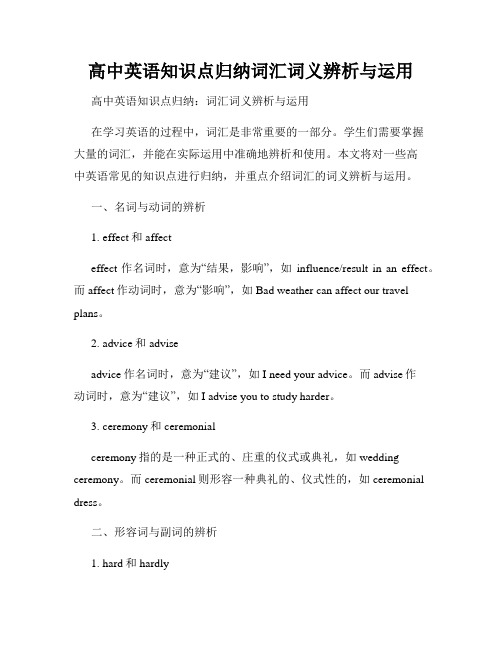
高中英语知识点归纳词汇词义辨析与运用高中英语知识点归纳:词汇词义辨析与运用在学习英语的过程中,词汇是非常重要的一部分。
学生们需要掌握大量的词汇,并能在实际运用中准确地辨析和使用。
本文将对一些高中英语常见的知识点进行归纳,并重点介绍词汇的词义辨析与运用。
一、名词与动词的辨析1. effect和affecteffect作名词时,意为“结果,影响”,如influence/result in an effect。
而affect作动词时,意为“影响”,如Bad weather can affect our travel plans。
2. advice和adviseadvice作名词时,意为“建议”,如I need your advice。
而advise作动词时,意为“建议”,如I advise you to study harder。
3. ceremony和ceremonialceremony指的是一种正式的、庄重的仪式或典礼,如wedding ceremony。
而ceremonial则形容一种典礼的、仪式性的,如ceremonial dress。
二、形容词与副词的辨析1. hard和hardlyhard作形容词时,意为“困难的”,如It's hard work。
而hardly作副词时,意为“几乎不”,如I hardly ever go to the cinema。
2. fast和fastlyfast作形容词时,意为“快的”,如a fast car。
而fastly虽然也是形容词,但在现代英语中几乎不用。
3. weak和weaklyweak作形容词时,意为“虚弱的”,如a weak person。
而weakly作副词时,意为“每周一次地”,如He visits his grandparents weakly。
三、动词的时态与语态的辨析1. do和makedo用来表示一般的动作或活动,如do homework。
高中英语词汇详解
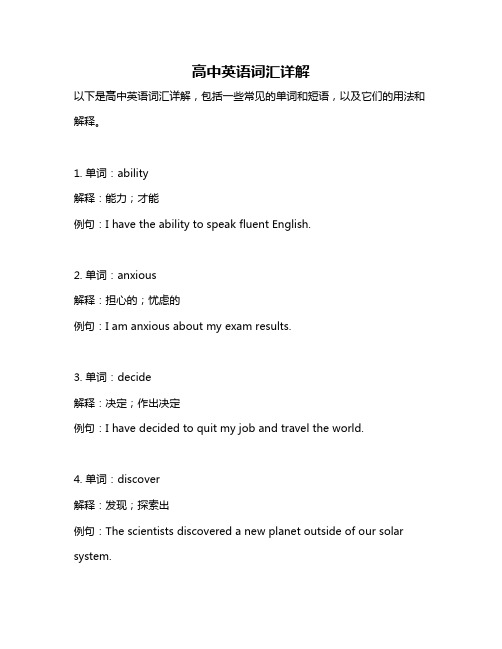
高中英语词汇详解以下是高中英语词汇详解,包括一些常见的单词和短语,以及它们的用法和解释。
1. 单词:ability解释:能力;才能例句:I have the ability to speak fluent English.2. 单词:anxious解释:担心的;忧虑的例句:I am anxious about my exam results.3. 单词:decide解释:决定;作出决定例句:I have decided to quit my job and travel the world.4. 单词:discover解释:发现;探索出例句:The scientists discovered a new planet outside of our solar system.5. 单词:embarrassed解释:尴尬的;难堪的例句:I felt embarrassed when I spilled my drink on the table.6. 单词:expect解释:期望;预料例句:I expect my child to do well in school.7. 单词:forget解释:忘记;遗忘例句:I forgot to bring my homework to class.8. 单词:happy解释:快乐的;愉快的例句:I am happy to see my family again after a long time away.9. 单词:impossible解释:不可能的;无法做到的例句:It is impossible for me to finish this project in one day.10. 单词:kind解释:友好的;善良的例句:She is a kind and gentle person.。
高中英语重点辨析词语

中学英语重点辨析词语1. damage, harm, hurt, injure,ruindamage:主要指造成价值、效用、完整性方面的损坏,多用于无生命的东西。
The water they had thrown over everything to put out the fire damaged the books.harm:主要用于有生命的东西,间或也用于无生命的事物,常指伤及一个人的健康、权利、事业等。
Though he knows clearly that smoking harms his health, he simply cannot give it up.hurt:尤其指感情或身体遭遇创伤。
My little boy fell off a ladder and hurt himself.You hurt my feelings!injure:尤指在事故中受伤,或损害,损害名誉、自尊等。
Three people were killed and five injured in the crash..ruin: 破坏,使毁坏,这种破坏是使某物价值或用处失去。
My new shoes got ruined in the mud.2.can & be able to 都可以表示能够。
can 有实力做某事,只有现在式和过去式两种形式。
be able to表示要经过一番努力才能做到的事,可用于各种时态,不能用与can连用。
If I concentrate on the work, I'll be able to work out the problem.I'll be able to speak French in another few months.3.grateful to & grateful for 都表示感谢。
grateful to指对……表示感谢,其中的介词to表示对象,宾语通常是人或组织团体。
新课标高中英语词汇讲解

新课标高中英语词汇讲解新课标高中英语词汇讲解主要侧重于帮助学生掌握高中阶段所需的英语词汇,以满足日常交流、学术学习和考试需求。
以下是一些关键点的讲解:1. 词汇量的重要性:词汇是语言学习的基础,丰富的词汇量能够提高学生的阅读理解能力、写作能力和口语表达能力。
2. 记忆词汇的方法:- 联想记忆法:通过将新词汇与已知词汇或生活经验联系起来,帮助记忆。
- 重复记忆法:通过反复阅读、听写和使用新词汇,加深记忆。
- 分类记忆法:将词汇按照主题或词性进行分类,有助于系统记忆。
3. 词汇的扩展:- 同义词和反义词:学习同义词和反义词可以帮助学生在表达时更加丰富和准确。
- 词根词缀:了解词根和词缀有助于学生猜测生词的含义,扩展词汇量。
4. 词汇的实际应用:- 在语境中学习:通过阅读文章、观看视频或参与讨论,将词汇放入实际语境中学习。
- 写作练习:通过写作练习,学生可以将学到的词汇运用到实际的语言表达中。
5. 词汇的复习与测试:- 定期复习:定期复习已学词汇,防止遗忘。
- 词汇测试:通过词汇测试来检验学习效果,及时发现并弥补知识漏洞。
6. 词汇学习资源:- 词汇书:选择适合自己水平的词汇书进行系统学习。
- 在线资源:利用在线词典、学习软件和教育平台进行词汇学习。
7. 词汇学习的策略:- 目标设定:为自己设定明确的词汇学习目标,如每天学习一定数量的单词。
- 持之以恒:词汇学习需要长期坚持,不断积累。
通过上述讲解,学生可以更系统地掌握高中英语词汇,为高中英语学习打下坚实的基础。
高中3500单词详解

高中3500单词详解1. a (an) [ə, eɪ(ən)] art.一(个、件……)2. abandon [əˈbændən] v.抛弃,舍弃,放弃3. ability [əˈbɪlɪtɪ] n.能力;才能4. able [ˈeɪb(ə)l] a.能够;有能力的5. abnormal [æbˈnɔːm(ə)l] a.反常的,变态的6. aboard [əˈbɔːd] prep.上(船,飞机,火车,汽车等)7. abolish [əˈbɔlɪʃ] v.废除,废止8. abortion [əˈbɔːʃ(ə)n] v.人工流产,堕胎9. about [əˈbaʊt] ad.大约;到处;四处prep.关于;在各处;四处10. above [əˈbʌv] prep.在……上面a.上面的ad.在……之上11. abroad [əˈbrɔːd] ad.到(在)国外12. abrupt [əˈbrʌpt] a.突然的,意外的,粗鲁13. absence [ˈæbsəns] n.不在,缺席14. absent [ˈæbsənt] a.缺席,不在15. absolute [ˈæbsəluːt] a.完全,全部,绝对的16. absorb [əbˈsɔːb] v.吸收,使全神贯注17. abstract [ˈæbstrækt] a./n.抽象的(作品)18. absurd [əbˈsɜːd] a.荒谬的,怪诞不经的19. abundant [əˈbʌndənt] a.大量,丰盛的,充裕的20. abuse [əˈbjuːz] v.(酗酒)滥用,虐待,恶语21. academic [ækəˈdemɪk] a./n.学术的,教学的22. academy [əˈkædəmɪ] n.专科学院,(美)私立学校23. accelerate [əkˈseləreɪt] v.(使)加速,加快24. accent [ˈæksənt] n.口音,音调25. accept [əkˈsept] vt.接受26. access [ˈækses] n./v.通道,入径,存取(计算机文件)27. accessible [əkˈsesɪb(ə)l] a.可到达的,可接受的,易相处的)28. accident [ˈæksɪdənt] n.事故,意外的事29. accommodation [əkɔməˈdeɪʃ(ə)n] n.住宿,膳宿30. accompany [əˈkʌmpənɪ] v.陪同,陪伴,与…同时发生31. accomplish [əˈkʌmplɪʃ] v.完成32. according to [əˈkɔːdɪŋtʊ] ad.按照,根据33. account [əˈkaʊnt] n.账目;描述34. accountant [əˈkaʊnt(ə)nt] n.会计,会计师35. accumulate [əˈkjuːmjʊleɪt] v.积累,积聚36. accuracy [ˈækjʊrəsɪ] n.准确,精确37. accuse [əˈkjuːz] v.正确无误的,精确的38. accustomed [əˈkʌstəmd] a.习惯于,惯常的39. ache [eɪk] vi.&n.痛,疼痛40. achieve [əˈtʃiːv] vt.达到,取得41. achievement [əˈtʃiːvmənt] n.成就,成绩,功绩42. acid [ˈæsɪd] a.酸的43. acknowledge [əkˈnɔlɪdʒ] v.承认44. acquaintance [əˈkweɪntəns] n.熟人,(与某人)认识45. acquire [əˈkwaɪə(r)] v.获得,得到46. acquisition [ækwɪˈzɪʃ(ə)n] n.获得,得到47. acre [ˈeɪkə(r)] n.英亩48. across [əˈkrɔs] prep.横过,穿过49. act [ækt] n.法令,条例v.(戏)表演,扮演(角色),演出(戏);行动,做事50. action [ˈækʃ(ə)n] n.行动51. active [ˈæktɪv] a.积极的,主动的52. activity [ækˈtɪvɪtɪ] n.活动53. actor [ˈæktə(r)] n.男演员54. actress [ˈæktrɪs] n.女演员55. actual [ˈæktʃʊəl] a.实际的;现实的56. acute a.十分严重的,(病)急性的57. AD n.公元58. ad [æd] (缩)=advertisementn.广告59. adapt [əˈdæpt] v.使适应,适合,改编60. adaptation [ədæpˈteɪʃ(ə)n] n.适应,改编本61. add [æd] vt.添加,增加62. addicted [əˈdɪktɪd] a.上瘾,成瘾,入迷63. addition [əˈdɪʃ(ə)n] n.增加;(算数用语)加64. address [əˈdres] n.地址65. adequate [ˈædɪkwət] a.合适的,合乎需要的66. adjust [əˈdʒʌst] v.调整,调节,适应,习惯67. adjustment [əˈdʒʌstmənt] n.调整,适应68. administration [ədmɪnɪˈstreɪʃ(ə)n] n.管理,行政部门69. admirable [ˈædmərəb(ə)l] a.值得赞赏的,可钦佩的70. admire [ədˈmaɪə(r)] v.钦佩;羡慕71. admission [ədˈmɪʃ(ə)n] n.准入,接纳72. admit [ədˈmɪt] vt.承认,准许(入场,入学,入会)73. adolescence [ædəʊ'lesns] n.青春,青春期74. adolescent [ædəˈlesənt] n.青少年75. adopt [əˈdɔpt] v.收养,领养76. adore [əˈdɔː(r)] v.(不用于进行时)热爱,爱慕某人77. adult [ˈædʌlt] n.成年人78. advance [ədˈvɑːns;(US)ədˈvæns] v.推进,促进;前进79. advantage [ədˈvɑːntɪdʒ] n.优点;好处80. adventure [ədˈventʃə(r)] n.冒险;奇遇81. advertise [ˈædvətaɪz] vt.为……做广告82. advertisement [ədˈvɜːtɪsmənt] n.广告83. advice [ədˈvaɪs] n.忠告,劝告,建议84. advise [ədˈvaɪz] vt.忠告,劝告,建议85. advocate [ˈædvəkət] v.拥护,支持,提倡86. aeroplane [`erə,pleɪn] n.(英)飞机87. affair [əˈfeə(r)] n.事,事情88. affect [əˈfekt] vt.影响89. affection [əˈfekʃ(ə)n] n.喜爱,钟爱90. afford [əˈfɔːd] vt.负担得起(……的费用);抽得出(时间);提供91. afraid [əˈfreɪd] a.害怕的;担心92. Africa [ˈæfrɪkə] *n.非洲93. African [ˈæfrɪkən] a.非洲的,非洲人的n.非洲人94. after [ˈɑːftə(r)] rad.在后;后来prep.在…之后;在后面conj.在…以后95. afternoon [ɑːftəˈnuːn] n.下午,午后96. afterward(s) [ˈɑːftəwəd(z)] ad.后来97. again [əˈɡeɪn] ad.再一次;再,又98. against [əˈɡeɪnst] prep.对着,反对99. age [eɪdʒ] n.年龄;时代100. agency [ˈeɪdʒənsɪ] n.代理机构101. agenda [əˈdʒendə] n.(会议)议程表,议事日程102. agent [ˈeɪdʒənt] n.代理人,经济人103. aggression [ˈəɡreʃ(ə)n] n.侵略104. aggressive [ˈəɡresɪv] a.侵略的;咄咄逼人105. ago [əˈɡəʊ] ad.以前106. agree [əˈɡriː] v.同意;应允107. agreement [əˈɡriːmənt] n.同意,一致;协定,协议108. agricultural [æɡrɪˈkʌltʃər(ə)l] a.农业的109. agriculture [ˈæɡrɪkʌltʃə(r)] n.农业,农学110. ahead [əˈhed] ad.在前,向前111. aid [eɪd] n.援助;救护;辅助器具112. AIDS [eɪdz] n.艾滋病113. aim [eɪm] n.目的;目标v.计划,打算;瞄准;针对114. air [eə(r)] n.空气;大气115. aircraft [ˈeəkrɑːft] n.飞机(单复数同)116. airline n.航空公司;航空系统117. airmail [ˈeəmeɪl] n.航空邮件118. airplane [ˈeəpleɪn] n.(美)飞机119. airport [ˈeəpɔːt] n.航空站,飞机场120. airspace [ˈeəspeɪs] n.领空,(某国的)空域121. alarm [əˈlɑːm] n.警报122. album [ˈælbəm] n.相册,影集,集邮簿123. alcohol [ˈælkəhɔl] n.含酒精饮料,酒124. alcoholic [ælkəˈhɔlɪk] a./n.含酒精的,酒鬼125. algebra [ˈældʒɪbrə] n.代数126. alike [əˈlaɪk] ad.很相似地,同样地127. alive [əˈlaɪv] a.活着的,存在的128. all [ɔːl] ad.全部地a.全(部);所有的;总;整pron.全部;全体人员129. allergic [əˈlɜːdʒɪk] a.过敏的,厌恶130. alley [ˈælɪ] n.小巷,胡同131. allocate [ˈæləkeɪt] v.拨给,划归,分配…给132. allow [əˈlaʊ] vt.允许,准许133. allowance [əˈlaʊəns] n.津贴,补助134. almost [ˈɔːlməʊst] ad.几乎,差不多135. alone [əˈləʊn] a.单独的,孤独的136. along [əˈlɔŋ;(US)əˈlɔŋ] ad.向前;和…一起;一同prep.沿着;顺着137. alongside [əlɔŋˈsaɪd;(US)əlɔːŋˈsaɪd] ad.在…旁边,与…同时138. aloud [əˈlaʊd] ad.大声地139. alphabet [ˈælfəbet] n.字母表,字母140. already [ɔːlˈredɪ] ad.已经141. also [ˈɔːlsəʊ] ad.也142. alternative [ɔːlˈtɜːnətɪv] a.可供替代,非传统的143. although [ɔːlˈðəʊ] conj.虽然,尽管144. altitude [ˈæltɪtjuːd;(US)ælˈtɪtuːd] n.海拔高度145. altogether [ɔːltəˈɡeðə(r)] ad.总共146. aluminium [æljʊˈmɪnɪəm] n.(化)铝147. always [ˈɔːlweɪz] ad.总是;一直;永远148. amateur [ˈæmətə(r)] a.业余爱好的149. amaze [əˈmeɪz] v.惊奇,惊叹;震惊150. amazing [əˈmeɪzɪŋ] a.惊奇,惊叹的;震惊的151. ambassador (ambassadress) [æmˈbæsədə(r)] n.大使152. ambiguous [æmˈbɪɡjʊəs] a.模棱两可的153. ambition [æmˈbɪʃ(ə)n] n.目标,野心,雄心,抱负154. ambulance [ˈæmbjʊləns] n.救护车155. America [əˈmerɪkə] *n.美国;美洲156. American [əˈmerɪkən] a.美国的;美国人的n.美国人157. among [əˈmʌŋ] prep.在…中间;在(三个以上)之间158. amount [əˈmaʊnt] n./v.金额,数量,总计159. ample [ˈæmp(ə)l] a.足够的,丰裕的160. amuse [əˈmjuːz] vt.(使人)快乐,逗乐161. amusement [əˈmjuːzmənt] n.娱乐162. analyze [`ænl,aɪz] v.分析163. analysis [əˈnæləsɪs] n.分析,分析结果164. ancestor [ˈænsəstə(r)] n.祖宗;祖先165. acchor v./n.锚,抛锚166. ancient [ˈeɪnʃənt] a.古代的,古老的167. and [ənd,ænd] conj.和;又;而168. anecdote [ˈænɪkdəʊt] n.逸事,趣闻169. anger [ˈæŋɡə(r)] n.怒,愤怒170. angle [ˈæŋɡ(ə)l] n.角度。
高中英语科三重点单词
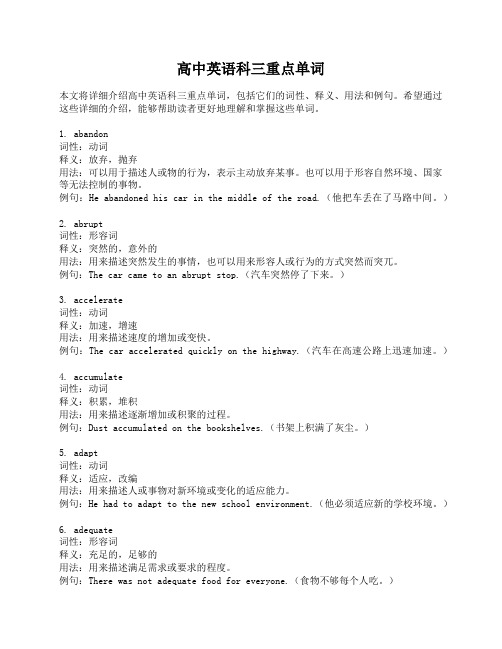
高中英语科三重点单词本文将详细介绍高中英语科三重点单词,包括它们的词性、释义、用法和例句。
希望通过这些详细的介绍,能够帮助读者更好地理解和掌握这些单词。
1. abandon词性:动词释义:放弃,抛弃用法:可以用于描述人或物的行为,表示主动放弃某事。
也可以用于形容自然环境、国家等无法控制的事物。
例句:He abandoned his car in the middle of the road.(他把车丢在了马路中间。
)2. abrupt词性:形容词释义:突然的,意外的用法:用来描述突然发生的事情,也可以用来形容人或行为的方式突然而突兀。
例句:The car came to an abrupt stop.(汽车突然停了下来。
)3. accelerate词性:动词释义:加速,增速用法:用来描述速度的增加或变快。
例句:The car accelerated quickly on the highway.(汽车在高速公路上迅速加速。
)4. accumulate词性:动词释义:积累,堆积用法:用来描述逐渐增加或积聚的过程。
例句:Dust accumulated on the bookshelves.(书架上积满了灰尘。
)5. adapt词性:动词释义:适应,改编用法:用来描述人或事物对新环境或变化的适应能力。
例句:He had to adapt to the new school environment.(他必须适应新的学校环境。
)6. adequate词性:形容词释义:充足的,足够的用法:用来描述满足需求或要求的程度。
例句:There was not adequate food for everyone.(食物不够每个人吃。
)7. adjacent词性:形容词释义:邻近的,毗连的用法:用来描述两个物体或地点之间的关系,表示靠近或接连的意思。
例句:The two houses are adjacent to each other.(这两幢房子彼此相邻。
高中英语知识点归纳词汇词义辨析与语境理解

高中英语知识点归纳词汇词义辨析与语境理解高中英语知识点归纳:词汇词义辨析与语境理解高中英语学科是学生们需要认真学习和掌握的科目之一。
对于英语学习者来说,掌握词汇的词义辨析和语境理解是非常重要的。
在本文中,我们将对高中英语知识点进行归纳总结,重点关注词汇词义辨析和语境理解。
一、常见的词汇词义辨析1. Accept vs. Except这两个词在发音上很相似,但含义和用法却不同。
Accept表示“接受”,而Except则表示“除了……之外”。
当我们在表达“除了某事物之外,其他都是如何如何”时,应该用Except。
例如:“All the students except Tom passed the exam.”(除了汤姆,其他学生都通过了考试。
)2. Affect vs. Effect这两个词的用法非常容易混淆。
Affect是一个动词,表示“影响”,而Effect则是一个名词,表示“结果”。
例如:“Her speech affected everyone in the room.”(她的演讲影响了房间里的每一个人。
)“The effect of pollution on the environment is devastating.”(污染对环境的影响是灾难性的。
)3. Principle vs. PrincipalPrinciple是一个名词,表示“原则”或“原理”,而Principal既可以表示“主要的”(作形容词),也可以表示“校长”(作名词)。
例如:“He always sticks to his principles.”(他总是坚守他的原则。
)“The principal of the school is a strict but fair person.”(这所学校的校长是一个严格但公正的人。
)二、词义辨析的重要性掌握词汇的正确词义辨析对于英语学习者的成绩和交流能力具有重要的影响。
准确使用词汇可以确保我们表达的准确性和清晰度。
高考英语词汇解析
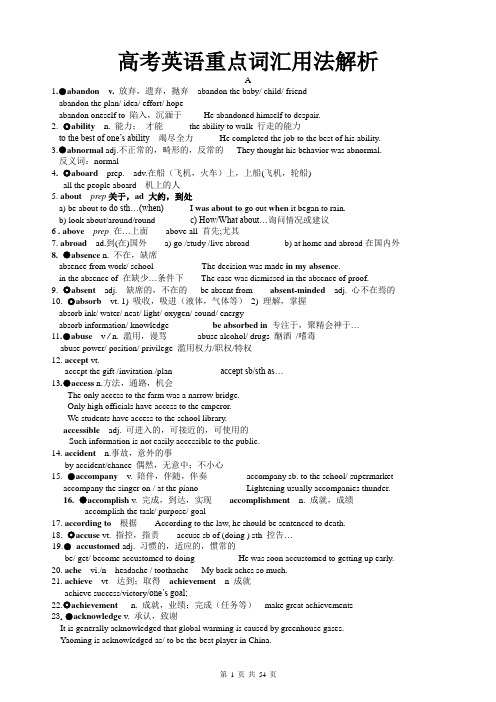
高考英语重点词汇用法解析A1.●abandon v.放弃,遗弃,抛弃abandon the baby/ child/ friendabandon the plan/ idea/ effort/ hopeabandon oneself to 陷入,沉湎于He abandoned himself to despair.2.◎ability n. 能力;才能the ability to walk 行走的能力to the best of one’s ability竭尽全力He completed the job to the best of his ability.3.●abnormal adj.不正常的,畸形的,反常的They thought his behavior was abnormal.反义词:normal4. ◎aboard prep. adv.在船(飞机,火车)上,上船(飞机,轮船)all the people aboard 机上的人5. about prep关于,ad 大约,到处a) be about to do sth…(when)I was about to go out when it began to rain.b) look about/around/round c) How/What about…询问情况或建议6 . above prep在…上面above all 首先;尤其7. abroad ad.到(在)国外a) go /study /live abroad b) at home and abroad在国内外8. ●absence n. 不在,缺席absence from work/ school The decision was made in my absence.in the absence of 在缺少…条件下The case was dismissed in the absence of proof.9. ◎absent adj. 缺席的,不在的be absent from absent-minded adj. 心不在焉的10. ◎absorb vt. 1) 吸收,吸进(液体,气体等)2) 理解,掌握absorb ink/ water/ neat/ light/ oxygen/ sound/ energyabsorb information/ knowledge be absorbed in专注于,聚精会神于…11.●abuse v / n. 滥用,谩骂abuse alcohol/ drugs 酗酒/嗜毒abuse power/ position/ privilege 滥用权力/职权/特权12. accept vt.accept the gift /invitation /plan accept sb/sth as…13.●access n.方法,通路,机会The only access to the farm was a narrow bridge.Only high officials have access to the emperor.We students have access to the school library.accessible adj. 可进入的,可接近的,可使用的Such information is not easily accessible to the public.14. accident n.事故,意外的事by accident/chance 偶然,无意中;不小心15.●accompany v. 陪伴,伴随,伴奏accompany sb. to the school/ supermarketaccompany the singer on / at the piano Lightening usually accompanies thunder.16. ●accomplish v. 完成,到达,实现accomplishment n. 成就,成绩accomplish the task/ purpose/ goal17. according to根据According to the law, he should be sentenced to death.18. ◎accuse vt. 指控,指责accuse sb of (doing ) sth 控告…19.●accustomed adj. 习惯的,适应的,惯常的be/ get/ become accustomed to doing He was soon accustomed to getting up early.20. ache vi./n headache / toothache My back aches so much.21. achieve vt 达到;取得achievement n 成就achieve success/victory/one’s goal;22.◎achievement n. 成就,业绩;完成(任务等)make great achievements23.●acknowledge v. 承认,致谢It is generally acknowledged that global warming is caused by greenhouse gases.Yaoming is acknowledged as/ to be the best player in China.I acknowledged financial support from the local government.24. across prep cross v. I walked across the street.; cross a street; come/run across碰到25. act n.法令,条例vt.表演,扮演,行动,做事act as 充当;扮演act out 把…表演出来26. action n. 行动take action to do sth put sth into action 把…付诸实施27. active adj. 积极的;主动的take an active part in /be active in 积极参加28.◎activity n. 活动outdoor activities 户外运动29.actual a.实际的actually adv. in (actual) fact 实际上30●adapt vi. 适应,适合,改编vt. 使适应adapt to change /the city lifeadapt oneself to the new surroundings adapt the novel for a film adaptation n. 适应31. add vt 添加,增加,补充说(that)add(…)to 添加add up 把…加在一起add up to总计为; 总数为a) His illness added to our trouble. b) He added that he would come again.c) Please add these figures up. d) These numbers add up to 100.e) He added some salt to the water.32. address n.地址vt.写地址;向…讲话(尤指演讲)address the letter to sb. 给某人寄信The letter was wrongly addressed.The president addressed the public.33.●adjust vt. 调整,调节,适应adjust your speed /the volume/ the cameraadjust to the dark/ the single life adjust yourself to the student life adjustment n. 调整,调节34.admire v 钦佩.;羡慕admire sb for sth I admire John for his courage.35. admit vt(admi tt ed ,admi tt ed)1) 承认admit one’s mistakes; admit doing/having don eHe admitted having stolen the money.2) 准许(入场,入学,入会)admit sb to /into→sb be admitted toHe has been admitted to Beijing University.36.●adopt v. 收养,采用,采纳adopt a child the adopted son/ daughteradopt a new policy/ a suggestion/ a plan/ an attitude37. advance vi推进,促进;前进adj. advanced先进的/ 高级的in advance预先,事先an advanced worker38. advantage n. 优点,好处(可数名词) 反:disadvantagetake advantage of 利用have an advantage over 优于…to sb’s advantage 对(某人)有利39. ◎advertise vt. 为…做广告1)为…做广告advertise a product / things2)登广告征求/寻找… advertise for a new sales manager40. advice n/u. advise vt. 忠告,劝告,建议take/follo w/ accept one’s advice 接受某人的建议ask sb for advice 向某人寻求建议 a piece of advice 一条建议give sb some advice on sthadvise sb (not) to do; advise doing; advise that …(should)+doOur teacher advised that we should study hard.41. ●affect vt. 影响, 深深打动,使悲伤等Smoking affects health. People were deeply affected by the death of Jin Zhengri.42. afford vt. 负担得起,抽得出(时间); 提供can/could/be able to afford sth/to do sth I can’t afford a book/to buy the book43. afraid a. 害怕的;担心be afraid to do 因为害怕不敢做…;be afraid of doing 害怕…She was afraid to go out alone at night. She was afraid of waking him up.44. against prep对着,反对, 靠着,迎着,衬着stand against the wall (靠墙站着) go against nature; be against sth 反对They are strongly against the plan. The pine tree were black against the morning sky.45. age n.年龄;时代vi. 变老for ages 多年; at an early age; at the age of … ;of the same age=of an age After his wife’s death he aged quickly.46. agree vi. 同意;应允1)agree with ①agree with sb / what you say/your opinion.②表示一致;― (食物、天气、工作等)对…适宜‖:The weather does not agree with me. 这种天气对我不适宜。
高中英语考点词语的重要解析

高中英语考点词语的重要解析(2)(4)discourage vt. 使泄气,使灰心例如:This failness has discouraged him greatly 这次失败,对他来说,打击很大。
词性转化:discourage vt. 使泄气→discouragement n. 气馁→encourage vt. 鼓励→encouragement n.鼓励→courage n. 勇气例如:The teacher often encourages us to learn all kinds of subjects to go to society for looking for a better job. 这位老师经常鼓励我们,学会各门功课,以便走上社会找到更好的工作。
名师点睛:本单词理应属于高考热点的单词,尤其是词性转化方面,几乎每年都有考查到的。
因此,要求学生认真对待,不要马虎。
因为这方面的考查,是衡量学生的英语水平高低的重要标志。
单项选择题:It may be difficult to do at first ,but please don't let this _______ you.A. encourageB. courageC.encouragementD. discourage答案:D本题主要考查词性转化的用法。
encourage 鼓励,courage 勇气,encouragement 鼓舞(作名词),discourage 气馁,挫折(作动词用)。
根据语境可知,答案的最佳选择是D.(5)admirable adj. 令人钦佩的例如:What you do like this is very admirable 你像这样做,是令人佩服的。
词性转化:admirable adj. 令人钦佩的→admire vt. 钦佩→admire vi. 赞美→admirably adv.钦佩地→admirableness n.钦佩例如:All of us admire his talent today 今天,我们都非常钦佩他的才华。
- 1、下载文档前请自行甄别文档内容的完整性,平台不提供额外的编辑、内容补充、找答案等附加服务。
- 2、"仅部分预览"的文档,不可在线预览部分如存在完整性等问题,可反馈申请退款(可完整预览的文档不适用该条件!)。
- 3、如文档侵犯您的权益,请联系客服反馈,我们会尽快为您处理(人工客服工作时间:9:00-18:30)。
高中英语考点词语的重要解析(3)
(7)precise adj. 准确的,精确的
例如:
This is a set of precise equipment , which is very advanced . 这是一台精密仪表设备,非常高科技的。
近义词:
accurate / exact/ precise / right/ true/ correct的区别
这些形容词均含“准确的,正确的”之意。
其区别如下:
1.accurate指通过谨慎的努力达到符合事实或实际,侧重不同程度的准确性,与事实无出入。
例如:
This answer is very accurate 答案非常准确
2.exact着重在质与量方面的准确,确切,语气比accurate强。
例如:
The exact number of protest calls has not been revealed. 抗议电话的确切次数尚未披露。
3.precise侧重精密准确,更强调细节的精确高端无误,非常严格的,没有丝毫的差错。
例如:
But they also have some very precise GPS positions and timing measurements.但他们同时还有非常精确的GPS定位及定时测量。
4.right使用广泛,可与这些词中的correct换用,但常暗示道德、理解、行动等方面的正确。
例如:
This clock has never told the right time.时钟从来都不报正确的时间。
5.true暗指绝对准确,尤指复制品与原件丝毫不差。
例如:
Many of his predictions are coming true. 他的许多预言都在成为现实。
6.correct最常用词,主要指按一定标准或规则来衡量,没有谬误和差错或无缺点错误。
作动词用时,correct 是纠正的意思。
例如:
The committee lacked a correct estimate of his ability. 委员会对他的能力缺乏正确的评价。
单项选择题:
As to how persons to be dead this time, ______ number of the dead is not known yet.
A. right
B.true
C. correct
D.exact
答案:D
本题主要考查近义词的区别。
right 正确,true 真正的,correct 恰当的,exact 确切的。
根据语境可知,答案的最佳选择是D.
(8)precious adj. 宝贵的, 珍惜的
近义词:
precious /valuable 的区别:
这两个词的共同意思是“贵重的”。
其区别是:
1.precious指任何无法用钱衡量的珍贵的东西,尤其适用于失掉后无法补偿的东西,还可用于人的感情方面;
例如:
Friendship between China and Krean is very precious .中朝之间的友谊是宝贵的
2.valuable指任何值钱的或可以带来巨额利润的、非常有用的或受人珍视的东西。
例如:
The land is quite valuable.这块地很值钱。
We have already taken up too much of your valuable time.我们占用了你许多的宝贵时间。
He is a valuable partner.他是个很难得的伙伴。
单项选择题:
This piece of ancient bowl is very ______ , it is priceless .
A. precious
B. valuable
C. price
D.value
答案:A
本题主要考查近义词的区别。
precious 珍贵的,valuable 有价值的,price 价格,value 价值。
根据语境可知,答案的最佳选择是A.。
